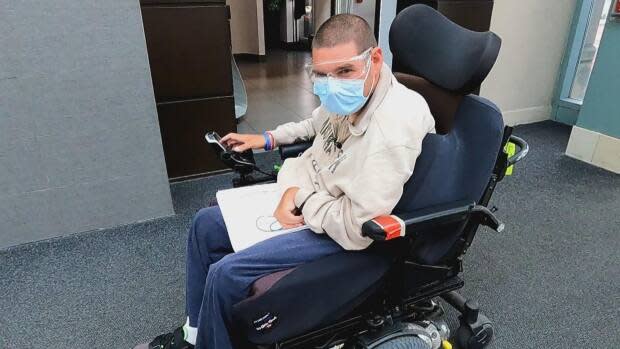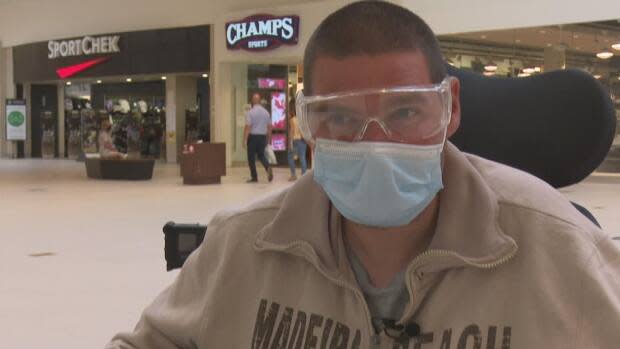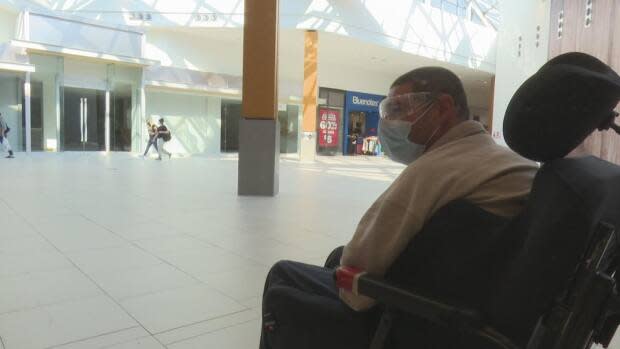Community living resident happy to be vaxxed — but can't know if his caregivers are

For the first time in 16 months, Windsor resident Nick Schuurman went to the mall.
His trip on Tuesday was a long time coming for the 35-year-old, who has cerebral palsy and asthma.
"I love going inside the mall, going in to some stores ... talking to some people ... socializing with people. I miss doing that," he said.
Schuurman's health conditions and the rules of his community living home prevented him from going out during the pandemic. It was only after he got fully vaccinated about a month ago that he could return to his active lifestyle.
His mall trip involved dropping off resumés, some window shopping and dinner at the food court.
The added layer of protection the vaccine has given him means there's only more trips like this to come. It also means Schuurman can un-pause his life and start planning for the future.
But the pandemic still isn't over, and he told CBC News that he still worries about getting sick.
"If I caught this virus, I could possibly go to the hospital and get hooked up to the ventilator, which I really don't want," said Schuurman.
And while he can control his own level of protection through who he sees and the personal protective equipment he wears, he still doesn't have full control over keeping the disease out of his home.
His community living home is run by Christian Horizons — an organization that supports people with developmental and physical disabilities.
Staff vaccinations not tracked or required
Multiple staff members come in and out of Schuurman's home to care for him and three other residents.
Schuurman says he's concerned that unvaccinated staff and residents could put him at risk.
"I don't feel comfortable living in a group home when staff don't take the vaccination," said Schuurman, adding he urges everyone to get vaccinated.
"This COVID-19 has been really challenging for me because I have not been able to go out anywhere and live my life like I used to." - Nick Schuurman
"I don't really feel safe knowing that they don't do it, and I talk to the people here and they can't force staff to take it. They say they have their rights, so not much I can do."
Christian Horizons CEO Janet Noel-Annable told CBC News there's no way for the organization to track the number of staff that have taken the vaccine, but she's confident the uptake in Windsor-Essex is high.
"We can't require people to report and right now there's no directives from the government for employees in our sector to become vaccinated," said Noel-Annable.
"We would love to know what our numbers are and we're working to find those out, to work with government to figure out how we can gather that information effectively."

If a resident wanted to refuse care from unvaccinated staff, that could possibly be accommodated, Noel-Annable said, though she emphasized that staffing resources are low.
"The challenge would be making sure we have enough employees to be able to provide safe and secure supports at that time," she said.
Ready to get back to pre-pandemic life
And while Schuurman's vaccine status means he's highly protected, Windsor-Essex medical officer of health Dr. Wajid Ahmed says Schuurman's continued level of concern is valid.
"The public, who may not have any of these medical conditions, they should be concerned and people, if they have a medical condition, obviously the concern for them should be slightly higher than that," he said.
Ahmed added, "we don't have enough data to suggest that the vaccine may not be effective with people with certain medical conditions, I haven't come across any data that would suggest that."

On top of this, Schuurman worries about there being an outbreak. If someone in the home does test positive, he'd likely have to quarantine while the organization and public health investigate. Depending on the situation and the level of contact he's had, he may have to self-isolate for the full 14 days.
Since the pandemic, Schuurman said he's had to quarantine in his room twice from outbreaks, and it's not something he wants to ever experience again.
"This COVID-19 has been really challenging for me because I have not been able to go out anywhere and live my life like I used to," he said.

 Yahoo Movies
Yahoo Movies 